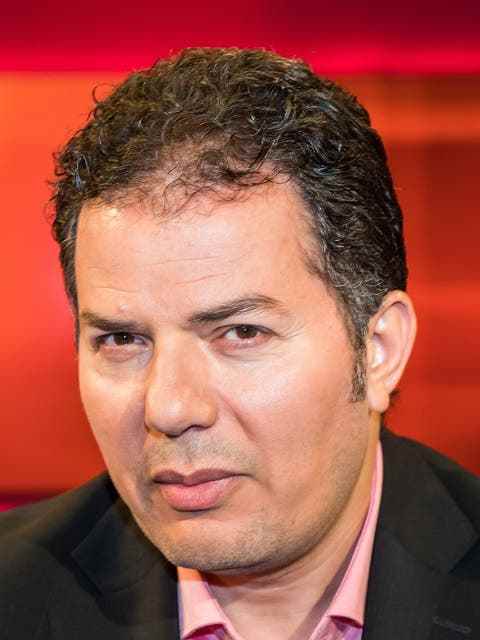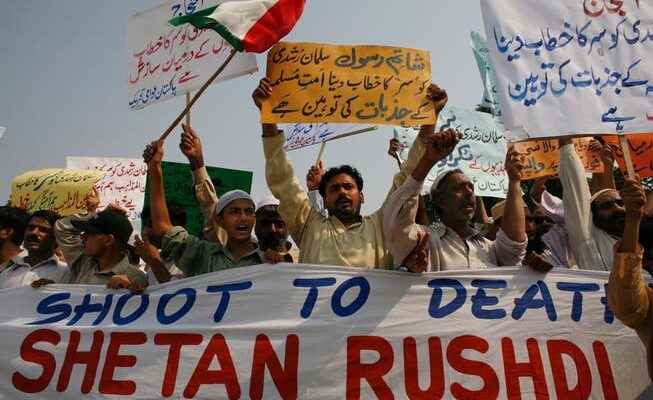My teacher in Egypt called Salman Rushdie “a dog.” As a child I hated the writer like many Muslims until I read his “Satanic Verses” myself. Behind the hatred of Rushdie is a deep hatred of Western culture.
Protest calling for the murder of Salman Rushdie after he was knighted by Queen Elizabeth, Islamabad 2007.
“So you’re the Egyptian Salman Rushdie everyone’s talking about?” said Salman Rushdie with a smile at our first and only meeting in Berlin three years ago. It was a celebration of the 30th anniversary of the fall of the Berlin Wall, coinciding with the 30th anniversary of the fatwa issued by Ayatollah Khomeini against Rushdie. «Thirty years ago there was one Salman Rushdie in the world, today there is at least one Salman Rushdie in every Islamic country, not to mention those in Western countries. That should please you,’ I replied.

Hamed Abdel-Samad, political scientist and author, 2018.
Rushdie was easygoing, funny, but vehemently rejected the role of hero and role model. Not wanting to be reduced to the fatwa, he came to the event without a bodyguard and simply wanted to be perceived as a novelist. I told him I hated him thirty years ago without reading a word he said. Today, however, I am one of his great admirers, not because of the death fatwa, but because of his great novels like The Wall’s Last Sigh and Midnight Children.
A Muslim knight against Satan
In 1989 I was still in high school in an Egyptian village when Khomeini demanded Rushdie’s death. Our Arabic teacher claimed that a Western-paid Indian writer named Salman Rushdie had insulted the Prophet Mohammed, calling him “a dog.” He quoted a poem by the famous Egyptian poet Farouk Gouida in which he criticized Rushdie and accused him of blaspheming Islam and its Prophet. The poet described Rushdie as a man whose heart was possessed by the devil and prophesied that one day a Muslim knight would cut off his satanic head.
Yes, it wasn’t a cleric, it was a poet of all people that fueled my hatred of Rushdie. As a devout Muslim who worshiped the Prophet, I had no choice at the time but to hate Rushdie just like everyone else around me. At the end of the same year I began studying English literature in Cairo and later came across a smuggled copy of The Satanic Verses. I found nothing in it that would justify the great hatred against Rushdie. It was a novel of magical realism like the works of Gabriel Garcia Marquez, only with touches of British humor and a touch of Indian storytelling.
When I heard about the attack on Salman Rushdie on Friday night, I was shocked, angry and deeply saddened. My first thought was of him, a 75-year-old suspended between life and death who has committed no crime other than exercising his right to artistic freedom. Then I thought of the Egyptian poet who, at the time, did not advocate a writer’s freedom of speech, but supported the angry mob and predicted the execution of Rushdie.
Who’s next?
This poet is still considered an excellent intellectual, not an Islamist, although many of his thoughts are deeply rooted in Islamism. Then I thought of myself, a writer who is much more critical of Islam than Rushdie and receives constant death threats as a result. I thought about the day an officer from the Berlin State Criminal Police Office came up to me and told me that from now on I was under police protection for twenty-four hours, gave me a bulletproof vest and told me to wear it to my lectures from now on , because the death threats against me are becoming more concrete and there are plans to carry them out.
All because I dared to write a book called Islamic Fascism. I thought of the numerous instances where security personnel, searching guests’ bags before my presentations, have confiscated metal objects that could be used as weapons. And the many times I was attacked on the street in Berlin despite being escorted by the police. Of the many nights of fear and despair.
Will I be the next victim? A question that automatically came to my mind after the Charlie Hebdo attack, then again after the beheading of French teacher Samuel Patty who dared to show cartoons of Mohammed in his classroom, and now after the assassination of Salman Rushdie .
Does there even have to be a next victim? Where is the source of the error? Does it lie in an unleashed ideology and theology of violence that has thrived at the heart of Islam for centuries and cannot be stopped? Or is it because Western politics hides the fear of terrorism and concerns about economic relations with Muslim countries behind respect, tolerance and diversity?
Or is it because most people here don’t care too much about freedom? Why can one criticize Jesus and Moses and Buddha, but not Mohammed? Why can a Salafist live and preach undisturbed in the West while every critic of Islam fears for his life here? Why are critics of Islam seen as troublemakers in the multicultural paradise, even though they profess Western values and even though this multicultural doctrine now offers many areas of refuge for Islamists?
Get well wishes from the Arab world
After a sleepless night, I was fed up with German newspapers that kept reporting that the motives for the Rushdie assassination were still unknown. I wondered what the literary figures and intellectuals in the Arab world were saying about the assassination, so I visited their social media accounts and was surprised to find some of them supporting Salman Rushdie and wishing him a speedy recovery.
They emphasized that one should react to thoughts only with thoughts. That gave me a little hope. But as I read on, I was disappointed. While many condemned the attack, they insisted that Rushdie’s novel The Satanic Verses was also a crime because it hurt the feelings of Muslims.
The absolute majority did not think about the old man who hovers between life and death, but saw that their religion was the real victim of the attack. They feared that the incident would tarnish Islam’s image and fuel Islamophobia in the West. Their views expressed infantility, selfishness and a lack of accountability, which I consider far more dangerous than Islamism itself. We are talking about the intellectual elite here and not the average citizen, who often reacts irrationally to criticism.
Secular icing
This elite continues to bury their heads in the sand and care more about the image of Islam than about the victims of Islamist violence. She is unable to identify the real causes of the misery. Behind her hatred of Rushdie is a deep hatred of the West and all that comes from it. Many of them have grown up with Islamist discourse from the earliest days, and even if they claim to be secular, the foundation of their mindset remains Islamist.
The elite does not see where the problem lies. The wrong diagnosis always leads to the wrong medicine, as has been the case in recent decades. They claim that the problem comes from outside, from the West’s attitude towards Islam, and not from Islam’s attitude towards the West and the world at large. A common tactic is to view Salman Rushdie as part of a Western agenda to undermine Islam. Some even go so far as to compare him to ISIS and Osama Bin Laden to avoid sympathizing with him. They use the same old tactic to discredit all critics of Islam.
So fundamentalism is up to mischief, and the hatred goes beyond the borders of the Islamic world and hits places like New York, London, Berlin and Paris. This hatred transcends all layers and is also generation-spanning. The perpetrator of the Rushdie attack is 24 years old. That means he was born years after Rushdie’s book and after Khomeiny’s fatwa. Still, he felt it his duty to shut up Rushdie forever because hatred is passed from one generation to the next.
Reason is lacking everywhere
It came as no surprise to me to read comments full of hatred, glee and conspiracy theories from ordinary Muslims, but it was shocking to see intellectuals – who themselves always call for more freedom of expression in their countries – failing not just a fellow writer, but also set up a tribunal for him while he is injured in an intensive care unit. It kind of reminded me of the reactions of some German intellectuals who, at the time of the Rushdie affair, instead of showing solidarity with their dying colleague, emphasized that his novel was not good literature, as if freedom of expression were tied to the literary quality of the work .
We are dealing with a zeitgeist in which rationality plays an ever smaller role in the West and in the East. In this vacuum created by the absence of reason, identitarian radical ideologies are proliferating and building centers of power that they will not abandon. The state is helpless and has no concepts. That’s why the editors of Charlie Hebdo, then Samuel Patty, and now Salman Rushdie became victims of deranged multiculturalism. And that’s why there will be a next victim, unfortunately!
Hamed Abdel Samad is German-Egyptian political scientist and author.
